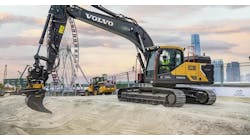Starting June 1, the nation’s refineries began producing low sulfur diesel fuel for use in off-road equipment. The new fuel will then wind its way through the distribution system, so that by Dec. 1, 2007, locomotives and marine vessels, as well as farming, construction and mining equipment, will switch to diesel containing nearly 85 percent less sulfur. This new off-road fuel has a sulfur content of 500 parts per million, reduced from 3,000 parts per million or more in the previous blend.
“June marks an important next step on the road to clean diesel. Last year saw the nationwide availability of on-highway ultra-low sulfur diesel fuel enabling manufacturers to engineer the cleanest diesel trucks ever,” said Allen Schaeffer, executive director of the Diesel Technology Forum. “This new fuel will begin bringing the same benefits to off-road equipment.”
By 2010, sulfur levels in most non-road diesel fuel will be reduced to 15 parts per million, making it possible for engine manufacturers to use advanced exhaust control systems that significantly reduce emissions. For locomotive and marine fuel, this step will occur in 2012.
Diesel is the predominant, and in some cases, exclusive source of power for many important sectors of the economy, including:
· Agriculture: Farms and ranches use diesel to power two-thirds of all agricultural equipment — almost $19 billion worth of tractors, combines, irrigation pumps and other farm equipment.
· Construction: Nearly 100 percent of off-road construction equipment — approximately $17 billion worth — is diesel-powered.
· Mining: Diesel power accounts for 72 percent of the power used in mining.
· Freight Transport: Ninety percent of the nation's freight tonnage and 94 percent of its total freight ton-miles are moved by diesel power, and while trucks move much of this cargo, diesel-powered non-road modes such as rail, shipping and intermodal transport chains also play a key role.
“Diesel engines are the workhorse of the American economy, offering an unmatched range of performance and economic advantages over other forms of energy, including more power, greater energy efficiency, increased safety, better durability and suitability for very large applications,” continued Schaeffer.
“This new off-road fuel, combined with innovative engine technology, will dramatically reduce diesel emissions, with far-reaching clean air benefits. The diesel industry is committed to being a part of the clean air solution without sacrificing the power, reliability, maintenance, and fuel economy of modern diesel equipment,” concluded Schaeffer.





